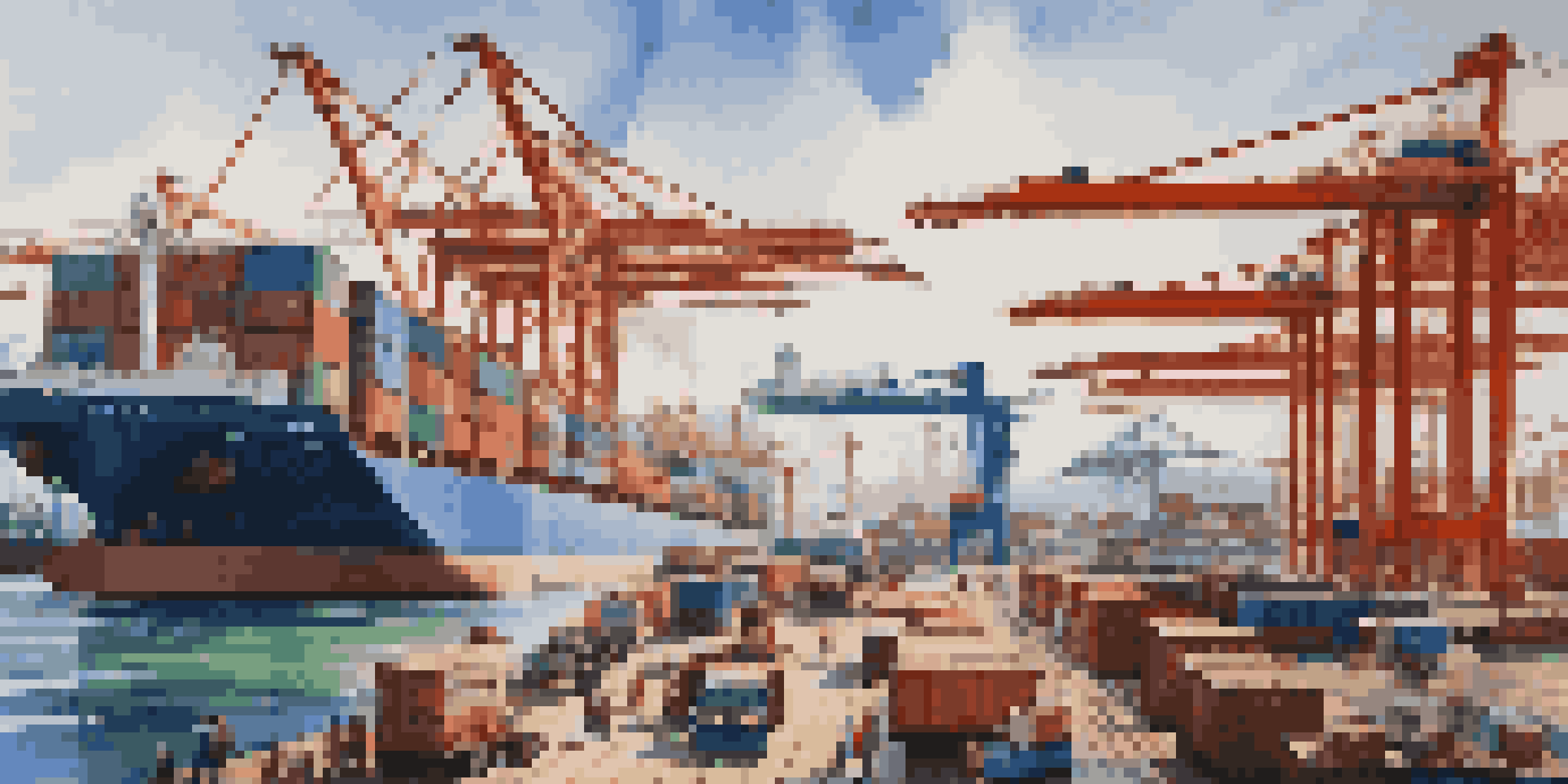How Global Trade Policies Influence Supply Chain Operations

Understanding Global Trade Policies and Their Importance
Global trade policies are the frameworks that govern how countries interact in terms of trade. These policies can include tariffs, trade agreements, and regulations that affect everything from the import and export of goods to labor practices. Understanding these policies is crucial for businesses, as they directly impact costs, supply chain efficiency, and market access.
Trade creates wealth and adds value to our lives.
For instance, a country may impose tariffs on imported goods to protect its domestic industries. This can lead to increased prices for consumers and challenges for businesses relying on imported materials. Therefore, staying informed about trade policies is vital for companies looking to optimize their supply chain operations.
Moreover, trade policies can change frequently based on political relations and economic conditions. This volatility makes it essential for businesses to adapt quickly to remain competitive in the global market.
The Role of Tariffs in Supply Chain Management
Tariffs are taxes imposed on imported goods, and they play a significant role in shaping supply chain strategies. When tariffs are high, importing goods becomes more expensive, which can lead companies to reconsider their sourcing strategies. They may seek alternative suppliers or even move production closer to home to avoid these additional costs.

For example, if a U.S. company faces high tariffs on steel imports from a specific country, it might look for domestic suppliers or explore options in countries with lower tariffs. This shift can lead to a restructuring of the entire supply chain, affecting pricing, delivery times, and overall operational efficiency.
Importance of Trade Policies
Understanding global trade policies is crucial for businesses as they directly impact costs, supply chain efficiency, and market access.
Ultimately, understanding how tariffs affect supply chain costs can help businesses make informed decisions that enhance their competitiveness and profitability.
Free Trade Agreements and Their Impact on Supply Chains
Free trade agreements (FTAs) are treaties between countries that reduce or eliminate trade barriers. These agreements can significantly enhance supply chain operations by lowering tariffs and streamlining customs procedures. As a result, companies can benefit from reduced costs and increased access to foreign markets.
In the world of commerce, the law of supply and demand is the most basic law of economics.
For instance, the North American Free Trade Agreement (NAFTA) allowed companies in the U.S., Canada, and Mexico to trade with fewer restrictions. This resulted in many businesses optimizing their supply chains across North America, leading to more efficient production and distribution processes.
However, while FTAs can create opportunities, they may also pose challenges. Companies must ensure compliance with the specific rules of origin and other regulations outlined in these agreements to fully benefit from the reduced tariffs.
Supply Chain Resilience Amid Changing Trade Policies
In today's rapidly changing global landscape, supply chain resilience is more important than ever. Businesses must be prepared to adapt to shifting trade policies, which can arise from geopolitical tensions, economic shifts, or global crises like pandemics. A resilient supply chain can withstand these shocks and continue to operate effectively.
For example, during the COVID-19 pandemic, many companies experienced disruptions in their supply chains due to changing trade regulations and border closures. Those that had diversified suppliers and flexible logistics strategies were better equipped to navigate these challenges, ensuring business continuity.
Role of Tariffs in Sourcing
High tariffs can force companies to rethink their sourcing strategies, potentially leading to a complete restructuring of their supply chains.
Investing in technology and data analytics can also enhance supply chain resilience by providing insights into potential disruptions and enabling quicker adaptations to new trade policies.
The Impact of Trade Policies on Global Supply Chain Trends
Trade policies can significantly influence global supply chain trends, shaping how businesses operate across borders. For instance, an increase in protectionist measures can lead to a trend of 'reshoring' or bringing production back to a company's home country. This shift can affect everything from labor costs to supply chain logistics.
Additionally, changing trade policies can push companies to explore new markets and diversify their supplier bases. For example, if tariffs on imports from China rise, companies may look to Southeast Asia or other regions for alternative suppliers, leading to a more diversified and potentially more resilient supply chain.
Understanding these trends allows businesses to anticipate changes and adapt their strategies accordingly, ensuring they remain competitive in a constantly evolving global marketplace.
Navigating Compliance with Trade Regulations
Compliance with trade regulations is crucial for businesses involved in international trade. This includes understanding the various laws and regulations that govern imports and exports, such as customs requirements and documentation. Failing to comply can lead to costly fines and disruptions to supply chains.
For example, a company that neglects to provide the necessary paperwork for imported goods might face delays in clearing customs, affecting its ability to deliver products on time. This kind of disruption can damage customer relationships and impact overall sales.
Need for Supply Chain Resilience
Investing in supply chain resilience is essential for businesses to adapt to changing trade policies and maintain operational effectiveness amid global disruptions.
Therefore, investing in compliance training and resources is essential for businesses to navigate the complexities of global trade policies effectively.
Future Trends in Global Trade Policies and Supply Chains
Looking ahead, the landscape of global trade policies is likely to evolve continuously, influenced by technological advancements and shifting economic priorities. Trends such as digital trade agreements and e-commerce regulations are becoming increasingly important as businesses adapt to the digital economy.
For instance, the rise of e-commerce has prompted countries to develop new trade policies that address the complexities of cross-border online sales. This shift will require businesses to stay agile and informed about these changes to ensure their supply chains can adapt accordingly.

In conclusion, staying ahead of future trade policy trends will be vital for businesses to maintain competitive supply chains and meet changing consumer demands.